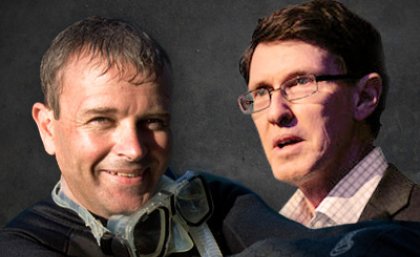
Two University of Queensland researchers have been announced as Laureate Fellows under the Australian Research Council’s most prestigious research grants scheme.
They are historian Professor Peter Harrison, Director of the Centre for the History of European Discourses, and sensory neuroscientist Professor Justin Marshall of the Queensland Brain Institute.
UQ Vice-Chancellor and President Professor Peter Høj said Professor Harrison and Professor Marshall were stellar researchers who would use their fellowships to supercharge the outcomes of their work, for Australians.
“Their potential impacts in areas such as biomedical imaging and the understanding of global security are reminders that excellence in research can become excellence-plus for society,” Professor Høj said.
“Australia needs a flagship scheme such as the ARC Laureate Fellowships, and UQ is delighted to join the government in backing top researchers and enabling them to mentor future knowledge leaders and innovators.
“These Laureate Fellowships will build on previous public investments in high-quality research, ensuring ongoing returns on funding for Australian research.”
Of the 16 new Laureates announced today, UQ topped the nation based on funds awarded, securing a total of $5.6 million.
Professor Marshall was awarded $2.97 million, the single highest amount in this round, and Professor Harrison was awarded $2.63 million, the highest amount across the humanities and social sciences.
The ARC funding consists of salary support, funding for postdoctoral researchers and postgraduate students, and significant project funding over five years. Additionally, Professor Marshall and Professor Harrison will receive UQ funding to support related capacity-building initiatives, including philanthropic funding to support additional PhD students.
Professor Marshall said his research into sensory neuroscience in nature – particularly in crustaceans and fish – was crucial to “bioinspired engineering” in areas as diverse as medical imaging and remote sensing from satellites.
“Nature has so much to teach us and the Great Barrier Reef (GBR) is packed with creatures with secrets to tell,” Professor Marshall said.
“My work on animal vision will show us new ways of visualising the underwater and terrestrial environment.
“The project is all about studying animals behaving and seeing in their natural habitat, not in the lab.
“Taking tips from sensory neuroscience teaches us how to design our own sensors better.”
Many animals experienced their world through colours and light modes that are invisible to humans, Professor Marshall said.
“The ‘evolved engineering’ power of the visual systems on the GBR is a resource we are only just beginning to understand. As new threats and competing interests surround the Reef, it is critical we understand what we have got there before we lose it.
“Australia has a proud tradition of showcasing its amazing animals and their extraordinary sensory adaptations. I am thrilled to continue that work.”
Professor Harrison said his research project would examine the growth of science and technology in the West and determine how this was linked to a corresponding decline in the influence of religion.
“It will also consider whether this pattern is likely to be true of all societies undergoing modernisation,” he said.
“The practical issues to be explored include the place of religion in global politics and liberal societies, the role of science in soft diplomacy, and the growing phenomenon of religiously motivated rejection of science, most notably evolutionary theory and, in some instances, climate science.”
Professor Harrison said his Fellowship would consolidate UQ research strength in the history of intellectual thought, as well as expanding Australia’s capacity in this field more broadly.
“It will also help build and maintain collaborative and interdisciplinary research links with the University of Oxford and the University of California, San Diego,” he said.
Professor Harrison was born in country Queensland, studied science at UQ and completed a PhD in religious history. He has studied at Yale University and was an Oxford Professor before returning to UQ in 2011.
“One of Australia’s attractions – aside from the weather – is the prospect of targeted research support for high quality projects,” he said.
“Both UQ and the ARC have excellent records in this respect.
“It is an honour to receive this Fellowship and I am very grateful for the support of the ARC and UQ.”
The ARC’s Australian Laureate Fellowships scheme is designed to attract and retain outstanding researchers, to provide exemplary mentorship and nurture early-career researchers, and to create an enduring legacy in ground-breaking international research with economic, environmental, social and cultural benefits for Australia.
UQ’s other ARC Australian Laureate Fellows are:
- Professor Hugh Possingham (2013)
- Professor Ove Hoegh-Guldberg (2012)
- Professor John Quiggin (2012)
- Professor Bernie Degnan (2011)
- Professor Alex Haslam (2011)
- Professor Jason Mattingley (2011)
- Professor Lorraine Mazerolle (2010)
- Professor Jennifer Martin (2009)
- Professor Peter Mumby (2009)
Contact: Dr Richard Kim, UQ Research & Innovation Office, ph +61 7 3346 0737; Fiona Cameron, UQ Communications, ph +61 7 3346 7086, communications@uq.edu.au
.jpg)
